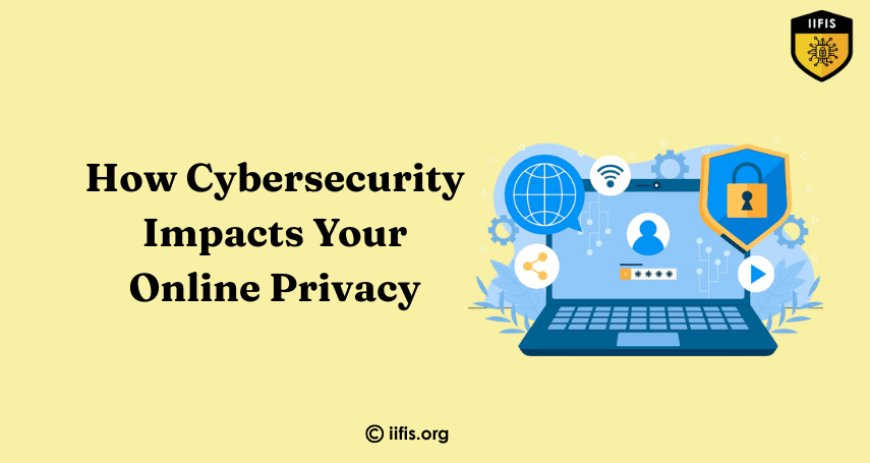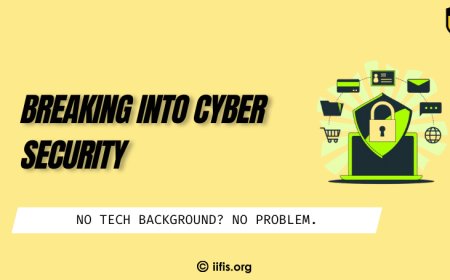How Cybersecurity Impacts Your Online Privacy
Learn how cybersecurity protects your online privacy, safeguards personal data, and why certifications are key to staying secure in the digital world.

As a cybersecurity expert with years of hands-on experience, I’ve seen how the smallest digital habits can open the door to serious privacy risks. What many people don’t realize is that online privacy and cybersecurity are deeply connected—you can’t have one without the other. Every unsecured device, weak password, or overlooked update can be an entry point for cyber threats. In this post, I’m breaking down how cybersecurity directly impacts your online privacy, sharing real insights from the field to help you protect what matters most—your identity, your data, and your peace of mind.
The Interconnection Between Cybersecurity and Online Privacy
Cybersecurity and online privacy are closely connected. Imagine your digital life as a house. Cybersecurity is the lock on the door and the system that keeps unwanted visitors out. Privacy is everything inside that house—your personal information, messages, photos, and more. Without strong cybersecurity, all of that is left open to threats.
Here’s how cybersecurity underpins online privacy:
-
Data Integrity: Cybersecurity ensures your data isn’t altered or tampered with by unauthorized individuals.
-
Confidentiality: Encryption and access controls protect sensitive communications and records from prying eyes.
-
Accountability: Strong cybersecurity frameworks log who accesses data and when, helping trace breaches and prevent abuse.
-
Anonymity Protection: Proper security settings help minimize the risk of identity theft and unauthorized tracking.
Common Cyber Threats That Undermine Your Privacy
Before my journey into the field of cybersecurity, I underestimated the sheer variety of threats lurking online. From phishing to malware, these attacks are designed to steal your information and compromise your privacy.
Most prevalent cyber threats include:
-
Phishing Scams: Fraudulent emails, texts, or websites that trick users into revealing sensitive data like passwords or credit card numbers.
-
Ransomware: Malicious software that locks your files until a ransom is paid, often targeting both businesses and individuals.
-
Man-in-the-Middle (MitM) Attacks: Intercepting data during transmission, especially over public Wi-Fi, can leak passwords or financial data.
-
Social Engineering: Manipulating people through deceit to gain access to personal or confidential information.
-
Spyware and Tracking Tools: Some applications monitor your activity, collect browsing habits, and sell your data to third parties.
How Cyber Security Certification Transformed My Perspective
Earning a cybersecurity certification was one of the most pivotal moments in my career. Not only did it deepen my technical knowledge, but it also reshaped how I viewed personal digital safety.
What I gained through certification:
-
Structured Learning: Step-by-step modules taught me everything from network security to ethical hacking.
-
Hands-On Labs: Simulations provided real-world experience in defending against cyber attacks.
-
Legal and Ethical Awareness: I learned about laws around data privacy and the ethical responsibilities of security professionals.
-
Incident Response Skills: I became equipped to act swiftly and effectively during security breaches.
-
Confidence and Credibility: The certification gave me both internal confidence and external validation of my expertise.
Practical Ways I Protect My Online Privacy
As a cybersecurity expert, I’ve implemented several steps in my day-to-day routine that significantly enhance my online privacy. You don’t have to be a pro to adopt these measures—just aware and proactive.
My go-to privacy practices include:
-
Using Password Managers: I generate strong, unique passwords for every account and avoid password reuse.
-
Enabling Multi-Factor Authentication (MFA): Even if a password is compromised, MFA provides an extra layer of protection.
-
Regular Software Updates: Patching software and firmware closes known vulnerabilities.
-
Limiting Permissions: I audit app permissions regularly—especially on mobile devices—and disable access to my camera, microphone, or location unless needed.
-
Secure Browsing: I use privacy-focused browsers and extensions that block tracking and ads.
-
VPN Usage: I use a virtual private network when working remotely or accessing sensitive information on public networks.

Each of these practices was reinforced during my cybersecurity certification training and continues to protect me today.
The Emotional Benefits of Cyber Security Awareness
Beyond the technical and practical, cybersecurity gives peace of mind. The more I learned and implemented, the less anxious I became about potential data breaches or identity theft.
Emotional advantages I’ve noticed:
-
Confidence in Transactions: I no longer second-guess making purchases or managing finances online.
-
Peace of Mind: I know my personal photos, messages, and financial data are secure.
-
Reduced Risk of Exploitation: Awareness has helped me avoid scams that target even the most tech-savvy users.
-
Empowered Family & Friends: I’ve helped my circle become more security-conscious too, making them less vulnerable to attacks.
Why Cyber Security Is a Lifelong Commitment
Technology is constantly evolving—and so are the threats. That’s why I make continuous learning a priority. Whether through self-study or pursuing updated cybersecurity certifications, staying ahead is non-negotiable.
How I stay current:
-
Subscribe to threat intelligence reports and newsletters to stay aware of the latest cyber threats and attack trends.
Participate in webinars and training sessions to learn directly from industry professionals. -
Regularly renew certifications and explore new specializations to keep my knowledge updated.
-
Join cybersecurity forums and online communities to share ideas and gain real-world insights from peers.
-
Practice in virtual labs and sandbox environments to build hands-on skills in a safe space.
Cybersecurity isn’t a “set it and forget it” solution—it’s an ongoing effort. The more updated I stay, the more secure my privacy becomes.
Cybersecurity is for everyone, not just IT professionals. Your data, from emails to bank details, is stored online. Keeping it safe should be a priority. Getting a cybersecurity certification gives you the skills to protect your digital life. It helps you understand the risks and how to prevent them.
Whether you want a career in cybersecurity or just more control over your privacy, now is the time to start. Learn. Protect. Stay safe.
























